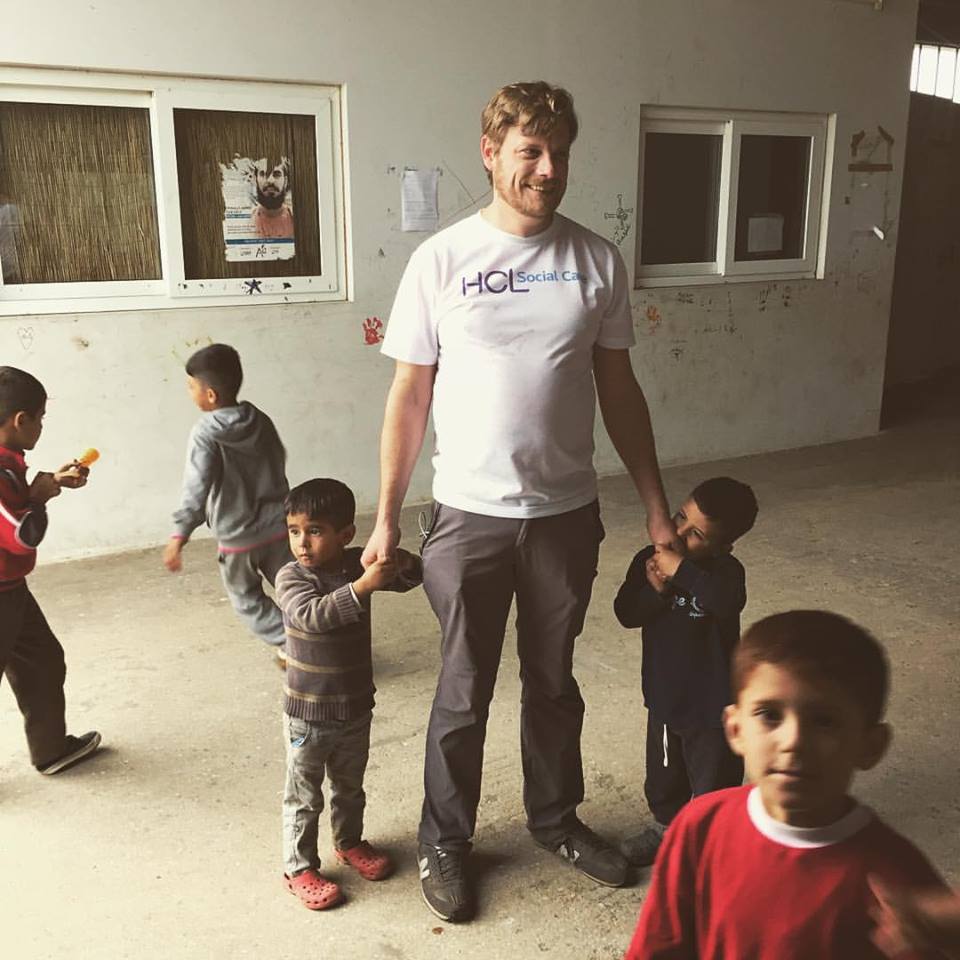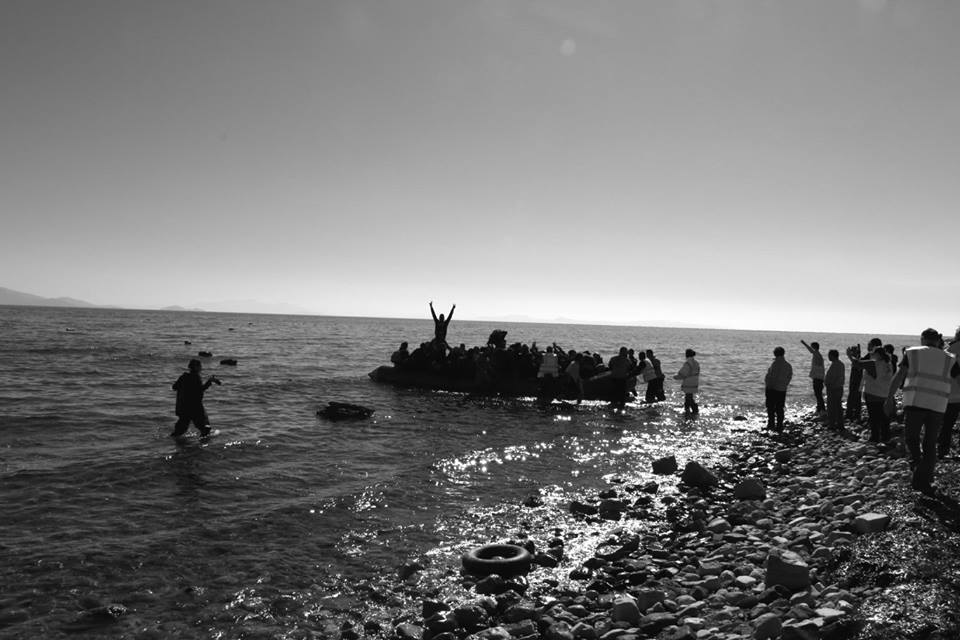Indigo volunteers: Revolutionising the volunteering sector
IndiGO is professionalising the volunteering sector by demolishing fees, offering training and organising aid missions. Gaggle is making doing good as easy as ordering an uber. Benjamin Western is one of the minds behind them, and he’s sharing his story.
By Rute Costa
Life after university can be daunting: the career uncertainties, the scramble for financial independence, the fear that unemployment may last forever. Even if, like Benjamin, you are one of the recent graduates who immediately land a corporate job, the worries don’t always fade away – they may just change. For Ben, there was an underlying sense of unfulfillment. He felt “detached”, that his work was not influencing the world in the way he wanted. So he dropped everything and, with his then girlfriend Holly, set out to travel the world and help others.
I ask Benjamin if he has always had this urge to create a positive social impact with his life. “My inspiration comes from my grandad”, he tells me, “Like many in his generation, he fought in the Second World War, then he was a builder, and had a tough life; but he dedicated the second half of his life to helping people as a missionary. He used to always tell me that ‘all we need to do in life is be kind to others’”.Ben is conscious of how much his family has shaped him to become who he is today. Despite being from a “relatively humble background”, he is acutely aware of his privilege growing up: “I thought: ‘well, I’ve got bus money, I have a free library, I’ve got a roof over my head, my mum feeds me every night, and we have free education and healthcare’”. He admits that, as a child, he “couldn’t stand injustice”. It is clear these instincts haven’t changed.
“Whenever I chatted to the volunteering organisations, they couldn’t justify why the fees they charged were so high.”
So when Holly and Ben decided to volunteer, all they wanted was to do their bit in bringing about equality and fairness. However, this wasn’t as simple as they thought. Soon, they realised there were plenty of obstacles in the way of their mission: the first were fees. Ben describes them as “ludicrous”, and tells me, with astonishment: “whenever I chatted to the volunteering organisations, they couldn’t justify why the fees they charged were so high”. After a long hunt they found their first volunteering platform: an orphanage in Morocco, which required only a nominal fee to volunteer. But even then, they were able to spot structural issues with the way volunteering was being conducted: “whilst we were very moved by what we saw in the orphanages, the volunteering was really irresponsible – we really didn’t need to be there, if anything we caused more harm than good. We came away feeling very sad about the whole affair”.

“It lit a fire in us to think: ‘surely, there’s got to be another way’”, Ben says. And so they created this other way! Over the next few years, Holly and Ben travelled to over a dozen countries in four continents, helping “humanitarian projects which were doing astonishing things with hardly any money, most of whom really needed volunteers”. During this time, connections and plans began forming, but, Ben emphasises, “the central idea was: ‘how can we help people volunteer without charging any fees?’” They built a network of projects from across the globe who wanted volunteers’ skills and help, not their money. Then, they connected them to those people back in the UK. indiGO Volunteers was born.
Saying that they are revolutionising the volunteering sector is no exaggeration. indiGO is not only widening the number of people who can now afford to volunteer, but also working hard to professionalise the sector, to make it, in Ben’s words, “truly responsible and ethical”. He explains: “It’s not about going out to do some sort of token effort, get selfies or whatnot – you are always going to do a proper job”. The cost per each indiGO volunteer is also, Ben says, “certainly more efficient than anything else out there”.
“The central idea was: ‘how can we help people volunteer without charging any fees?’”
“And what, in your opinion, makes a great volunteer?”, I ask him. “That’s a great question, the most important question”, Ben prefaces. He has obviously given this a lot of thought, and his answer is as thought through as it is natural. Firstly, humility: “I don’t care about people taking selfies, as long as they genuinely care, work hard, and behave with absolute respect and humility. The great volunteers are the ones who work with the projects, being sure they respect and support their culture When you’re humble you ask questions and you listen, first”. Secondly, “action”: people who are proactive and initiate, who are able to commit themselves to the project, and help find solutions to problems. Then, Ben says, “curiosity”: the volunteers who make the most out of the experience are those who seek to know more, and to find out how their skills can most help the project. They are also the most likely to do it long-term. Finally, Ben adds a bonus thought: “people who find a way to create a ripple effect”. He explains: “There’s a power in telling people what you’ve done, because it can inspire them to do it as well. We can never have enough volunteers until we rid the world of inequality!”

It’s Benjamin’s turn to tell me what he’s done: “what were the volunteering experiences that most affected you?” I ask. He struggles to find “the ones”, because there are so many. “Seeing how some people live in Kosovo stopped me in my tracks”, he says, “it shocked me particularly because it was only a two hour flight from the UK, and yet the poverty is beyond comprehension”. Ben was helping a charity called Hope and Aid Direct, who drive convoys of aid goods there every year, and the experience hit close to home: “It is haunting to see people live in such squalor, with little to no hope of their life ever changing”, he tells me.
Then he mentions the island of Lesbos, in Greece, and recalls “being there when people are coming in on boats and seeing every human emotion from pure elation to pure devastation, seeing kids who have lost their parents being handed off to the UNHCR [United Nations High Commissioner for Refugees], not knowing where they’ll end up”. He carries on: “To see the misguided propaganda that was being written by the press in the UK was so nauseating. The narrative was so often that people were coming here for work (or worse, benefits). But they’re not: every person we spoke to never wanted to leave their home – otherwise they would have come here prior to the wars in Syria. They had no choice but to leave, and their grace in the face of being treated less than cattle was both humbling and inspiring. The state of the refugee camps, particularly Moria and Idomeni was like living on set of a horror movie. Holly and I have been to lots of impoverished places and seen life going on, but this was different: it was like a warzone on the shores of Europe”. There is a brief moment of silence before either of us can utter another word.
“The state of the refugee camps, particularly Moria and Idomeni was like living on set of a horror movie.”
Returning to an environment where most have not witnessed similar experiences of poverty and conflict is never easy: “To begin with, [Holly and I] would come back from these trips and no one would understand, and we were personally changing”. He is open and honest: “I’m a very emotional person, so I was always quite upset, and also quite angry [when I returned], and people couldn’t resonate with it, they didn’t know how to”. Ben became “incredibly spiritual”, and eager to create more projects that could fight inequality through volunteering. Holly realised she loves being on the ground, coordinating volunteers. The couple grew apart and separated, but their work remains together and whole.

Holly is currently in charge of a major operation that coordinates and trains volunteers to help with the refugee crisis in Europe. This year alone, the indiGO team has processed over a thousand volunteers in Greece and Serbia. Their work has been crucial in assessing the needs on the camps, and allocating help according to the volunteers’ skills. Benjamin tells me that it can get chaotic out there, with numerous organisations focusing on different missions – from schools to food distribution – and that IndiGO is working to keep communication and collaboration at the centre.
Benjamin has now started a new charity called Gaggle which aims to “make doing good as easy as ordering an uber”. He explains that this tech startup was born out of the frustrations he still encountered after having spent years working in the volunteering sector: “What I kept coming back to was: ‘I know people care, and they absolutely intend to do good, but they just don’t do it’”. Ben realised that heavy admin was one of the main reasons standing in the way of potential volunteers: out of 100 who show interest, only 3 actually volunteer. He explains: “If you want to get a date, order a film, get some food, order a taxi, you pull out your phone, you click a couple of buttons and it’s done. Yet, for doing good you have to log onto some really bad websites, sift through loads of information, fill out forms, and it just puts people off”. Through collaboration with a designer, Adam, a marketer, Phill, and their tech-man, Clive, Ben wants to “combat that” and make the charity sector more tech-savvy and user-friendly.
“If you want to get a date, order a film, get some food, order a taxi, you pull out your phone, you click a couple of buttons and it’s done. Yet, for doing good you have to log onto some really bad websites, sift through loads of information, fill out forms, and it just puts people off.”
A revolution is in motion for the volunteering sector: IndiGO has made it more accessible through deleting fees, and Gaggle through the use technology and data. Benjamin also tells me about IndiGO’s self-sustainability model: through organising volunteering projects for businesses, they have managed to secure funding without relying on donations. There is still, however, a lot of space for change and growth. In an ideal future, Ben hopes IndiGO can scale to more productively use its data, and to be able to specialise in providing ethical, efficient and supportive volunteering in crisis situations, whilst gently running fee-free volunteering across the globe.

Taking advantage of this momentum in our conversation, with thoughts of hope and future still lingering in our minds, I ask Benjamin what one thing he would change in the world, if he could: “I would get every human being to reach out and just volunteer for a couple of hours each week in their community. I believe if we all did that, we would change so much”.
Follow Ben’s projects (indiGO and Gaggle) to keep up to date with their progress and find out how you can help.
